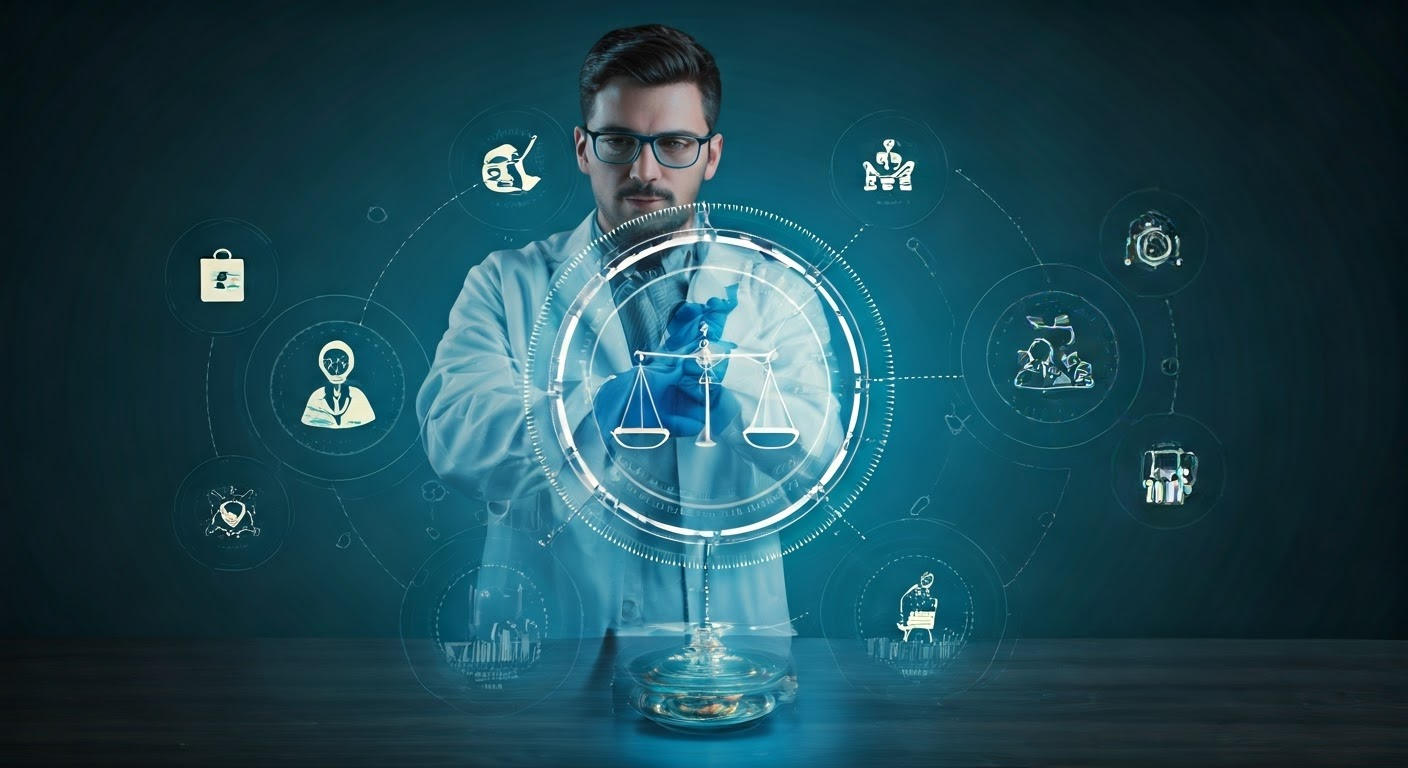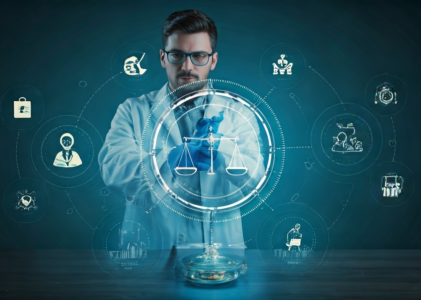Understanding the Pharmaceutical Drug Development Process

Key Highlights
- Explore the historical milestones and evolution of pharmaceutical drug development.
- Understand the key stages in the drug development process, from discovery to clinical research.
- Learn about the challenges faced in drug development, including regulatory hurdles and ethical considerations.
- Discover the role of biotechnology in drug development, focusing on genetic engineering and monoclonal antibodies.
- Delve into the advancements of artificial intelligence and machine learning in drug discovery.
- Gain insights into the financial aspects of drug development, including costs, funding, and investment strategies.
Introduction
Embark on a journey into the complex world of drug development, starting with important breakthroughs in basic research history to today’s scientific growth. Understand the stages of drug development, from the first discovery to the clinical research phases. Discover the challenges faced along the way, like dealing with rules and meeting ethical standards in clinical trials. Find out how biotechnology, genetic engineering, and monoclonal antibodies help shape the design of drugs. Get ready to explore how artificial intelligence and machine learning speed up drug discovery processes. Welcome to the exciting area of pharmaceutical innovations.
The Evolution of Pharmaceutical Drug Development
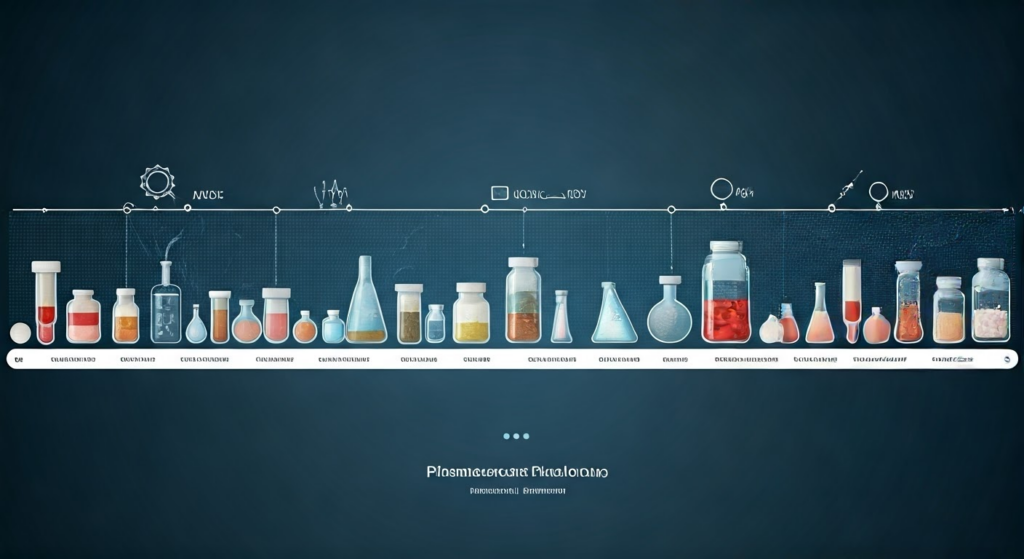
Pharmaceutical drug development has changed a lot over the years. It started with ancient remedies and has grown into modern therapies. The history of drug discovery has led to today’s new and advanced medicines. The journey from early research to getting approval for the market shows how far we have come in this field. This evolution is the result of teamwork among different groups, like regulatory authorities and different companies in the pharmaceutical sector. New ideas in drug research and development have changed how new treatments are offered to people.
Historical Milestones in Drug Discovery
The path to discovering drugs has some important moments. It started in the early 19th century when morphine was isolated. This was a big step for controlling pain and helped us learn about the healing qualities of plants. Then, Alexander Fleming found antibiotics, which changed how we treat infections. In the 1920s, the creation of insulin became important for managing diabetes. These key events in drug discovery set the stage for the advanced drug development we see today.
Modern Advances in Pharmaceutical Sciences
In recent years, new changes in medicine technology have changed how drugs are made. Now, we use artificial intelligence, machine learning, genetic engineering, and biotechnology. These have made drug discovery and development faster and more accurate. By using these advanced tools, researchers in the pharmaceutical industry can quickly find possible drug options and improve the success of clinical trials. These innovations will keep influencing the future of healthcare and the drug development process.
Key Stages in the Drug Development Process
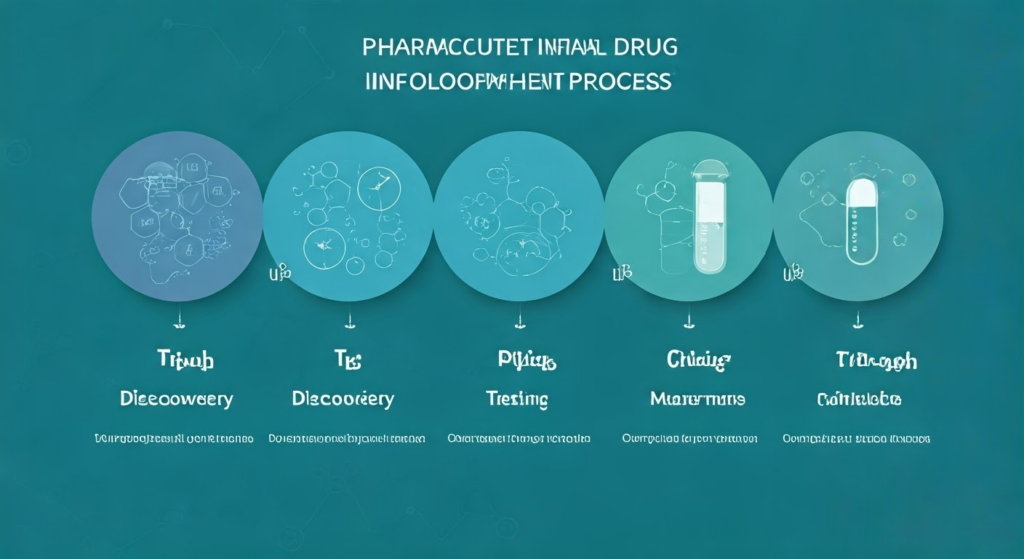
Drug development has several key stages that are important for getting new drugs to market. The process starts with discovery and preclinical testing. Here, the safety and effectiveness of a new drug are checked. After that, clinical research phases begin, which includes the clinical trials with different groups of patients to collect information about how well the drug works and any side effects it may have. Finally, the drug needs regulatory approval from authorities like the FDA before it can be given to a much larger population of patients.
Discovery and Preclinical Testing
Pharmaceutical drug development starts with an important phase called the process of drug development, specifically discovery and preclinical testing. In this phase, researchers find new drugs through careful research and testing on biological systems. Scientists look at different chemical compounds to study their effects and safety before moving on to clinical trials. Preclinical research gives important early information. It helps show if a new drug could work well, which is key for the next steps in the development process. This stage is essential before beginning clinical development.
Clinical Research Phases Explained
Clinical research phases are very important in creating new drugs. First is Phase I, which looks at safety in a small group of people. Next is Phase II, where the focus is on how well the drug works in a larger group. Then comes Phase III clinical testing, which tests the drug’s effectiveness in an even much larger population of patients. Finally, Phase IV checks how well the drug does after it gets approved. Each phase gathers key data about the new drug’s safety profile, how effective it is, and any possible side effects. This information is vital for getting regulatory approval in the pharmaceutical industry.
Challenges in Drug Development
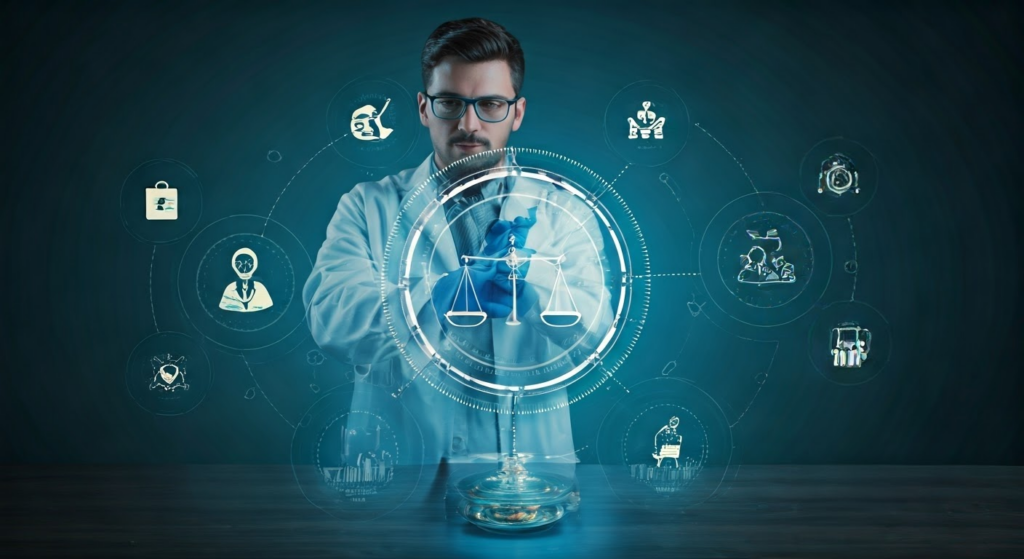
Developing new drugs is tough because of strict rules and compliance issues. Regulatory authorities, like the FDA, have many demands. Meeting these demands takes a lot of careful work and paperwork. There are also ethical issues in clinical trials. This is especially true for vulnerable groups, such as pregnant women. Keeping patients safe while finding new treatments is hard. It requires understanding complex rules and balancing science with ethics. Drug development is a challenging and complicated task.
Regulatory Hurdles and Compliance
Navigating rules and following laws are very important for developing new drugs. Regulatory authorities like the FDA create strict guidelines. They use these guidelines to check how safe and effective new drugs are during clinical trials. To meet these requirements, it is essential to keep detailed records and follow ethical standards when doing research with people. Following these rules is key to getting approval for new drug applications. While these rules help keep people safe, they can also slow down the process and increase costs of drug development. This shows how important it is to have expertise in regulatory matters in the pharmaceutical industry.
Ethical Considerations in Clinical Trials
Ethical considerations in clinical trials are very important to protect the well-being of participants and maintain fairness. It is essential to ensure informed consent, reduce risks, and keep information private. Following these principles builds trust in the pharmaceutical industry and research community. Being clear about results, keeping conflicts of interest away, and respecting a participant’s choice are key ideas. Sticking to ethical guidelines protects participants and supports the trustworthiness of clinical research. This is vital for advancing drug development in a fair and responsible way.
The Role of Biotechnology in Drug Development
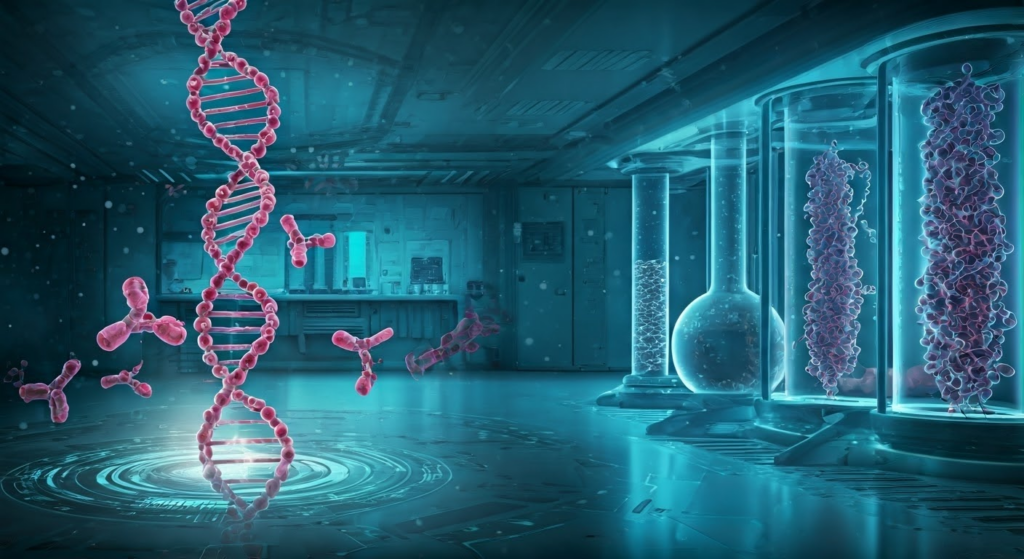
Genetic engineering is very important in making drugs that target certain diseases. It helps improve how well treatments work. Monoclonal antibodies are key in focused therapies, providing precise ways to treat different health issues. Using biotechnology allows for customized medicines, changing how we care for patients. This new method in drug development leads to better treatment options. By using biotechnological tools, we can create new medicines that have a better chance of success. This opens the door for exciting treatments that can meet needs that are not currently being met.
Genetic Engineering and Drug Design
Genetic engineering is very important in making new drugs. It helps create targeted therapies that fit individual genetic profiles. Scientists can change genetic material to make medicines aimed at the root causes of diseases. This new method improves treatment effects and reduces side effects. It changes how we create and develop new drugs. With genetic engineering, researchers can design precision medicines that provide personal treatment options for different health issues.
Monoclonal Antibodies and Their Therapeutic Uses
Monoclonal antibodies are very important in today’s medicine. They offer targeted treatments for different diseases. These antibodies are made to attach to specific targets. They have changed how doctors treat illnesses like cancer, autoimmune disorders, and infections. The pharmaceutical industry uses the unique ability of monoclonal antibodies to create new treatments. These new treatments usually have fewer side effects than regular medicines. The various uses of monoclonal antibodies show the great promise of biologics. They help create better and more personalized therapies for patients.
Artificial Intelligence and Machine Learning in Drug Discovery

The use of artificial intelligence (AI) and machine learning (ML) in drug discovery has changed the pharmaceutical industry. AI looks at large sets of data to find possible drug candidates. This makes the discovery process much quicker. ML models help predict how well a drug will work and how safe it will be. This leads to better results in clinical trials. By using these technologies, researchers can make new drugs better and faster. This helps bring new treatments to patients more efficiently.
Accelerating Drug Design
Using artificial intelligence (AI) and machine learning (ML) helps speed up drug development. These tools quickly look at large amounts of data. They find promising compounds for further study. This process makes it easier to narrow down which new drug candidates to focus on from many options. By adding these technologies into drug development, researchers can make the design phase faster. This way, they can provide new therapies to patients more efficiently. In the end, this could change the pharmaceutical industry.
Predictive Modeling in Drug Efficacy and Safety
Pharmaceutical companies are using predictive modeling more often to make drugs safer and more effective. They use advanced algorithms and artificial intelligence to simulate how a new drug will work in biological systems. This helps them to see how well the drug will work and what side effects it may have. With this approach, they can find good candidates for drugs early in the development process. This way, they can cut costs and speed up the time it takes to take drugs from the lab to the market. Predictive modeling can change the way new drugs are created. It can help ensure these drugs are safe and effective.
Financial Aspects of Drug Development
Navigating the financial side of developing new drugs takes careful planning. It’s very important to know the costs involved, from early research to market approval and various therapeutic areas. Funding and investment are key to supporting this long and costly process. Pharmaceutical companies need to look closely at the average cost of getting a new drug to market, which keeps increasing. By matching their financial resources with the stages of drug development, stakeholders can make their investments better. This can help bring forward new treatments.
Understanding the Costs Involved
The process of developing pharmaceutical drugs costs a lot of money at different stages. From the beginning research to clinical trials and getting final approval, costs can grow a lot. The factors that affect these costs include research and development, following rules, and making the drug. In recent studies, it has been shown that on average, bringing a new drug to market can take billions of dollars. There is also a high risk of failure at every step, which makes expenses even higher. For pharmaceutical companies, knowing this financial picture is very important. It helps them make smart choices and use their resources well.
Funding and Investment Strategies
Securing funding is very important in drug development. Companies use different investment strategies to help with the expensive and complex process. They often rely on venture capital, form partnerships with well-known pharmaceutical companies, and seek government grants, including support from the National Science Foundation. These methods not only help with financing but also encourage teamwork, sharing resources for successful drug development. It’s important to find the right balance between risk and return on investment to bring in stakeholders. Knowing the financial landscape is key to moving through the changing pharmaceutical industry.
The Impact of Regulatory Bodies
Regulatory bodies are very important in developing pharmaceutical drugs. They make sure that new treatments are safe and effective. For example, the FDA looks over the drug approval process in the United States. It sets strict standards for regulatory approval. Around the world, different regulatory agencies create guidelines to protect public health. Pharmaceutical companies and drug companies must follow these regulatory requirements to sell new medicines. It is crucial for them to know and navigate the regulatory pathways in order to succeed in drug development.
FDA’s Role in Drug Approval
The FDA is very important for approving drugs. They make sure that medicines are safe and work well before they can be sold. Getting approval from the FDA is not easy. It involves closely looking at clinical data, drug administration methods, and possible side effects. Their checks help protect public health by carefully examining the risks and benefits of new drugs. When a drug gets FDA approval, it shows that it meets the needed standards for quality, efficacy, and safety. This builds trust for both healthcare providers and patients.
Global Regulatory Variations and Challenges
Global rules and challenges in making pharmaceutical drugs create a tricky situation for companies wanting to get approval in various areas. Each regulatory authority has different standards. This means companies must carefully follow the rules to remain compliant. Approval steps, safety rules, and data needs can be different in every market. This requires a special plan for each one. Cultural and legal differences also add to the difficulty of developing drugs worldwide. Making all these different regulations match up is a big problem for companies that want to introduce new treatments to the global market.
Patenting in the Pharmaceutical Industry
Securing patents is key in the pharmaceutical industry. It helps protect intellectual property. This means protecting new drug discoveries to encourage innovation. Patents give exclusive rights to the inventor for about 20 years. This allows pharmaceutical companies to recover development costs. By protecting new compounds or formulas, patents stop others from making the drug. This protects investments. It also promotes ongoing research and development in the field. Pharmaceutical companies depend on patents to stay competitive and enhance advancements in healthcare.
Protecting Intellectual Property
In drug development, it is very important for pharmaceutical companies to protect their intellectual property. This helps them keep their inventions safe. The market is always changing, so getting patents for new drugs is key for staying exclusive and making money. When companies have patents, they stop others from copying their research and development. This helps them maintain a competitive edge. The process includes legal steps to defend their unique formulas and technologies used in new drug discoveries. This protection encourages innovation and supports further progress in the field.
Patent Lifecycles and Extensions
Patents are important in developing drugs in the pharmaceutical industry. They help protect new ideas by giving exclusive rights to the creator for a certain time. The time a patent lasts can affect how a drug competes in the market. Companies usually try to get extensions to keep those exclusive rights longer than the original time given. These extensions are crucial because they help increase the money earned from research and development. This, in turn, encourages more new ideas in the industry.
Conclusion
The process of developing pharmaceutical drugs is a complicated but important journey. It combines new science with following rules. The industry learns from past events, includes modern breakthroughs, key steps in development, and new technologies like AI and biotechnology. Each part, from clinical trials to getting approvals for new molecular entities, shapes the end result of launching new drugs. Even with challenges and high costs, the industry keeps focusing on providing safe and useful treatments. The future of drug development looks bright with new advancements and a strong goal of bettering healthcare for everyone.
Frequently Asked Questions
What Are the Main Phases of Clinical Trials?
Clinical trials have important stages:
- Phase 1 is about safety and involves a small group of people.
- Phase 2 tests how well the treatment works in a bigger group.
- Phase 3 checks the results by testing on an even larger group.
- Phase 4 happens after the treatment is available and involves monitoring its effects.
How Long Does It Take for a Drug to Come to Market?
It usually takes about 10 to 15 years for a drug to reach the market, including steps regulated by the European Medicines Agency. This time includes research, development, clinical trials, regulatory approval, and checking after it is on the market. The process is detailed and strict to make sure the drug is safe and effective.
What Is the Role of the FDA in Drug Development?
The FDA is very important in drug development. It makes sure that medicines are safe and work well. They check and approve drugs through strict processes. The FDA sets rules, inspects companies, and keeps an eye on drugs after they are sold. This helps protect public health.
How Do Companies Fund Drug Development?
Companies pay for drug development in different ways. They get money from private investments, government grants, partnerships, and loans. The costs of research and development can be very high, especially in the private sector. This leads companies to look for funding from venture capitalists. They may also work with academic institutions to help cover the expensive drug development process.
Can Artificial Intelligence Replace Human Researchers in Drug Discovery?
Artificial intelligence is helpful in speeding up drug discovery. However, the skills and creativity of human researchers are still essential. AI makes the process more efficient and improves predictions. At the same time, human management adds important scientific accuracy and critical thinking, which are key for making new breakthroughs.
https://doi.org/10.1086/508314
https://pubmed.ncbi.nlm.nih.gov/33346134
https://pubmed.ncbi.nlm.nih.gov/21091654
https://www.ncbi.nlm.nih.gov/pmc/articles/PMC6609997
https://ui.adsabs.harvard.edu/abs/2016Natur.536..388M
https://www.sciencedirect.com/science/article/pii/S2452302X1600036X
